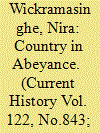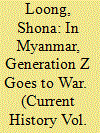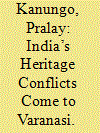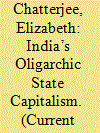| Srl | Item |
| 1 |
ID:
189713


|
|
|
|
|
| Summary/Abstract |
Amid an economic meltdown in 2022, a nonviolent citizens movement in Sri Lanka ousted Prime Minister Mahinda Rajapaksa and President Gotabaya Rajapaksa, brothers from a family that had dominated national politics since 2005. But Parliament filled the presidential vacancy with Ranil Wickremesinghe, a six-time former prime minister seen as a proxy for his predecessors. After a draconian crackdown on protesters, the streets have quieted. But the country’s underlying economic and political crisis, which has roots in the early postcolonial period and the civil war, and was worsened by the Rajapaksas’ autocratic misrule, persists. The new administration has avoided the systemic change demanded by protesters.
|
|
|
|
|
|
|
|
|
|
|
|
|
|
|
|
| 2 |
ID:
189715


|
|
|
|
|
| Summary/Abstract |
Afghanistan’s Taliban are back in power. How did they get there? How can their discriminatory policies be explained? And what can be done about it? The article looks back at the failure of international engagement in Afghanistan from 2001 to 2021 and the dynamics that enabled the Taliban to reemerge. Having gained control of the country again in August 2021, the article unpacks the way they govern and control populations, how decisions are made within the divided movement, and how its highly oppressive policies have developed. The article concludes by looking at the Taliban’s approach toward the international community and the resulting limited pathways for constructive engagement.
|
|
|
|
|
|
|
|
|
|
|
|
|
|
|
|
| 3 |
ID:
189714


|
|
|
|
|
| Summary/Abstract |
Days after Myanmar’s February 2021 coup, young people took to the streets. The protests were tongue-in-cheek at first, but soon gave way to a grave civil war. Understanding this shift from nonviolent protests to armed resistance requires shedding two frames that have been applied to Myanmar in the past: those of liberal democracy and state failure. Doing so brings into focus how, to an extent unprecedented in Myanmar, the anti-coup movement is challenging entrenched divides between “democracy” and “ethnonationalism,” and between “conflict” and “politics.”
|
|
|
|
|
|
|
|
|
|
|
|
|
|
|
|
| 4 |
ID:
189717


|
|
|
|
|
| Summary/Abstract |
India’s ruling Hindu nationalist party is pursuing a campaign to revise history and remove historic Islamic monuments from cities like Varanasi, known for its multicultural fabric.
|
|
|
|
|
|
|
|
|
|
|
|
|
|
|
|
| 5 |
ID:
189712


|
|
|
|
|
| Summary/Abstract |
Almost nine years into Narendra Modi’s premiership, there is little sign of an ideological commitment to the free market at the apex of the Indian state. Instead, this article characterizes India’s developmental model as a form of state capitalism, structured by the government’s direct influence on economic relationships. The Modi government took office in the midst of a legitimacy crisis generated by the state-dominated financial system. In response, it has fostered an increasingly oligarchic state capitalism, aiming to mobilize private resources through a narrow alliance of state and business interests. This strategy entails serious economic distortions and political risks.
|
|
|
|
|
|
|
|
|
|
|
|
|
|
|
|
| 6 |
ID:
189716


|
|
|
|
|
| Summary/Abstract |
The 2022 floods that affected 33 million people in Pakistan resulted from a confluence of factors. The nation is highly vulnerable to climate change, which requires international action. But internal governance reforms are needed to improve the state’s ability to help citizens recover from the floods and better prepare for future natural disasters. Pakistan has mismanaged its natural resources and is mired in economic and political crises. In rural areas, colonial-era patterns persist in unequal control over land and water. Though some lessons were learned from major 2010 floods, the latest disaster response revealed a need for improving coordination across different levels of government and engaging with civil society.
|
|
|
|
|
|
|
|
|
|
|
|
|
|
|
|